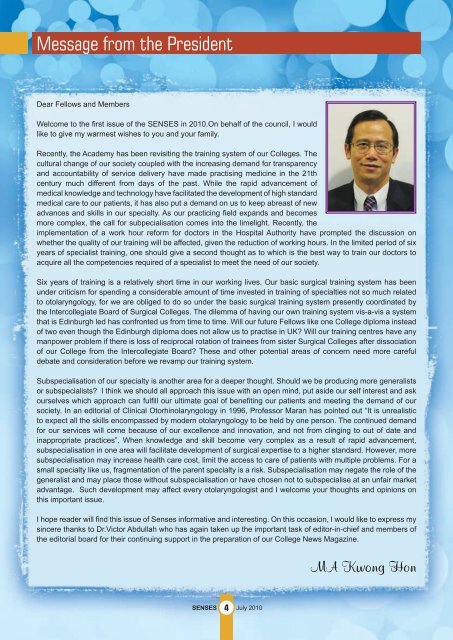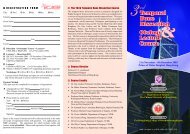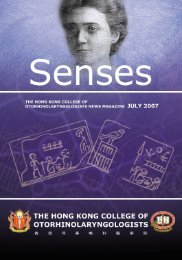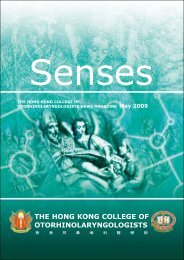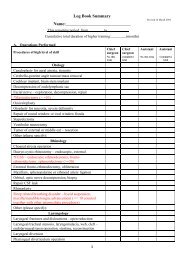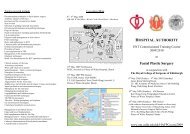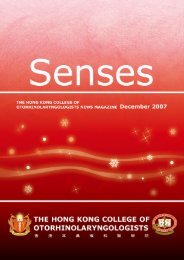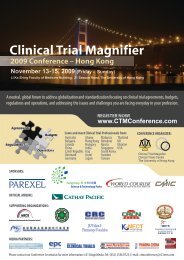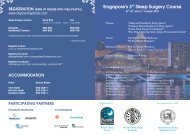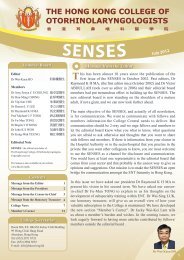Download - The Hong Kong College of Otorhinolaryngologists
Download - The Hong Kong College of Otorhinolaryngologists
Download - The Hong Kong College of Otorhinolaryngologists
Create successful ePaper yourself
Turn your PDF publications into a flip-book with our unique Google optimized e-Paper software.
Message from the President<br />
Dear Fellows and Members<br />
Welcome to the first issue <strong>of</strong> the SENSES in 2010.On behalf <strong>of</strong> the council, I would<br />
like to give my warmest wishes to you and your family.<br />
Recently, the Academy has been revisiting the training system <strong>of</strong> our <strong>College</strong>s. <strong>The</strong><br />
cultural change <strong>of</strong> our society coupled with the increasing demand for transparency<br />
and accountability <strong>of</strong> service delivery have made practising medicine in the 21th<br />
century much different from days <strong>of</strong> the past. While the rapid advancement <strong>of</strong><br />
medical knowledge and technology have facilitated the development <strong>of</strong> high standard<br />
medical care to our patients, it has also put a demand on us to keep abreast <strong>of</strong> new<br />
advances and skills in our specialty. As our practicing field expands and becomes<br />
more complex, the call for subpecialisation comes into the limelight. Recently, the<br />
implementation <strong>of</strong> a work hour reform for doctors in the Hospital Authority have prompted the discussion on<br />
whether the quality <strong>of</strong> our training will be affected, given the reduction <strong>of</strong> working hours. In the limited period <strong>of</strong> six<br />
years <strong>of</strong> specialist training, one should give a second thought as to which is the best way to train our doctors to<br />
acquire all the competencies required <strong>of</strong> a specialist to meet the need <strong>of</strong> our society.<br />
Six years <strong>of</strong> training is a relatively short time in our working lives. Our basic surgical training system has been<br />
under criticism for spending a considerable amount <strong>of</strong> time invested in training <strong>of</strong> specialties not so much related<br />
to otolaryngology, for we are obliged to do so under the basic surgical training system presently coordinated by<br />
the Intercollegiate Board <strong>of</strong> Surgical <strong>College</strong>s. <strong>The</strong> dilemma <strong>of</strong> having our own training system vis-a-vis a system<br />
that is Edinburgh led has confronted us from time to time. Will our future Fellows like one <strong>College</strong> diploma instead<br />
<strong>of</strong> two even though the Edinburgh diploma does not allow us to practise in UK Will our training centres have any<br />
manpower problem if there is loss <strong>of</strong> reciprocal rotation <strong>of</strong> trainees from sister Surgical <strong>College</strong>s after dissociation<br />
<strong>of</strong> our <strong>College</strong> from the Intercollegiate Board <strong>The</strong>se and other potential areas <strong>of</strong> concern need more careful<br />
debate and consideration before we revamp our training system.<br />
Subspecialisation <strong>of</strong> our specialty is another area for a deeper thought. Should we be producing more generalists<br />
or subspecialists I think we should all approach this issue with an open mind, put aside our self interest and ask<br />
ourselves which approach can fulfill our ultimate goal <strong>of</strong> benefiting our patients and meeting the demand <strong>of</strong> our<br />
society. In an editorial <strong>of</strong> Clinical Otorhinolaryngology in 1996, Pr<strong>of</strong>essor Maran has pointed out “It is unrealistic<br />
to expect all the skills encompassed by modern otolaryngology to be held by one person. <strong>The</strong> continued demand<br />
for our services will come because <strong>of</strong> our excellence and innovation, and not from clinging to out <strong>of</strong> date and<br />
inappropriate practices”. When knowledge and skill become very complex as a result <strong>of</strong> rapid advancement,<br />
subspecialisation in one area will facilitate development <strong>of</strong> surgical expertise to a higher standard. However, more<br />
subspecialisation may increase health care cost, limit the access to care <strong>of</strong> patients with multiple problems. For a<br />
small specialty like us, fragmentation <strong>of</strong> the parent specialty is a risk. Subspecialisation may negate the role <strong>of</strong> the<br />
generalist and may place those without subspecialisation or have chosen not to subspecialise at an unfair market<br />
advantage. Such development may affect every otolaryngologist and I welcome your thoughts and opinions on<br />
this important issue.<br />
I hope reader will find this issue <strong>of</strong> Senses informative and interesting. On this occasion, I would like to express my<br />
sincere thanks to Dr.Victor Abdullah who has again taken up the important task <strong>of</strong> editor-in-chief and members <strong>of</strong><br />
the editorial board for their continuing support in the preparation <strong>of</strong> our <strong>College</strong> News Magazine.<br />
MA Kwong Hon<br />
SENSES 4 July 2010


